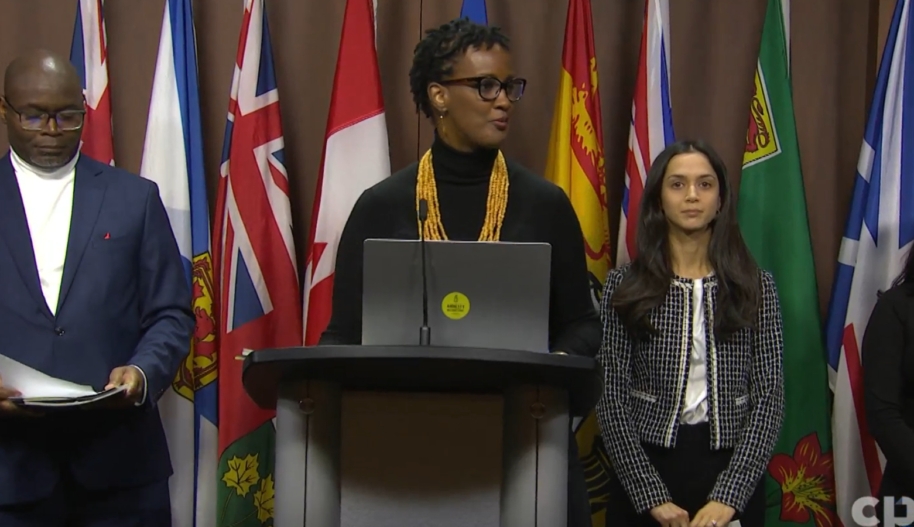Amnesty International Canada unveiled its 2023 Human Rights Agenda (HRA) on Monday, laying out the global organization’s calls to action for parties and politicians vying for power in Canada’s next federal election.
- Watch Amnesty International Canada’s press conference live on CPAC
- Watch Amnesty International Canada’s press conference live on Facebook
Announced at a press conference on Parliament Hill, the HRA reviews Canada’s human rights performance over the previous year, measuring it against the country’s international commitments. This year’s edition includes concrete, actionable steps for Canada to realize its domestic and international human rights obligations concerning Indigenous rights, gender rights, migrants’ rights, racial justice, the protection of human rights defenders, corporate accountability, and the environment.
“Our 77 calls to action establish a floor – not a ceiling – for what respecting human rights looks like in 2024 and at the beginning of the next Parliamentary session, regardless of who is in power,” said Ketty Nivyabandi, Secretary General of Amnesty International Canada’s English-speaking section. “Politicians of every stripe have an equal duty to uphold human rights. We urge them to look to the Human Rights Agenda as a non-partisan blueprint to address urgent human rights concerns facing Canada today.”
Rising anti-human rights rhetoric ‘dangerous and irresponsible’
The next federal election promises to be one of the most consequential in Canadian history, Nivyabandi said. “From the housing crisis, to the surging impacts of climate change, and the enduring crisis of Indigenous rights, the challenges Canada faces – and how we respond to them – will have life-and-death consequences for people here and abroad. Human rights must be front and centre in the conversation over Canada’s future leadership.”
Amnesty International Canada expressed pressing concern over the rise of anti-2SLGBTQQIA+ and anti-migrant policy proposals and rhetoric in Canada, adding that basic human rights must never be subject to debate, much less in the upcoming election. “We are deeply troubled by attacks on the rights and dignity of some of the most vulnerable members of society for short-term political gain,” Nivyabandi said. “Discriminating against trans women or refuting migrants’ right to seek asylum not only contravenes Canada’s constitutional and international human rights obligations, but it puts real people at an increased risk of violence and harassment. This is dangerous and irresponsible.”
Need to respect Indigenous rights, shift away from fossil fuels
The Human Rights Agenda is launching at the beginning of Canada’s 2024 wildfire season, which threatens to be worse than last year’s record-breaking season. Meanwhile, the federal government and provinces such as British Columbia continue to promote the interests of the fossil fuel industry at the expense of Indigenous rights and the global push to moderate climate change.
“On the heels of the worst wildfire season on record, the Canadian government and the province of British Columbia continue to criminalize Indigenous land defenders opposed to the building of the Coastal GasLink LNG pipeline on unceded Wet’suwet’en territory,” said Nivyabandi, referencing rights violations explored in Amnesty International’s 2023 report ‘Removed from our land for defending it:’ Criminalization, Intimidation and Harassment of Wet’suwet’en Land Defenders. “Authorities must immediately stop prosecuting Indigenous people for defending their territory and upholding their Nations’ rights. Approval for resource projects, including the Coastal GasLink pipeline, that have not received the free, prior, and informed consent of all affected Indigenous Nations must be withdrawn.”
In addition, Nivyabandi said, the rights and voices of Indigenous Nations must be at the heart of any national debate over Canada’s evolving efforts to stave off the worst impacts of climate change. “We challenge political leaders to treat climate change as the emergency it is: the greatest threat to human rights, health, and security facing Canada right now.”
The 2023 Human Rights Agenda also highlights significant concerns over Canada’s non-adherence to international obligations in foreign policy, including around arms export permits and post-shipment controls. “Canada must immediately stop all arms exports to Israel, Peru and other countries where the risk of illegal use against civilians exists,” Nivyabandi said.
“We look forward to a spirited, fact-driven debate on how to meet and exceed Canada’s human rights obligations,” she added. “A strong Canada on human rights not only serves and keeps Canadians safe, but it contributes to a more secure, peaceful, and sustainable world.”













